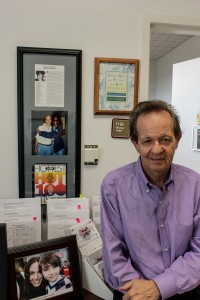
Back in 1978, “Nippy” was the only name by which FAU professor Michael Zager knew her. He didn’t know then, couldn’t know then, that the shy, church-singing, 14-year old girl would become multi-platinum icon Whitney Houston.
As the world reflects on the life of the late legend, Zager sits in his office — Room 111 of the Arts and Humanities Building — remembering the moment he first met her and the opportunity he gave her to record her first professional solo track, “Life’s a Party.”
Zager is now the director of FAU’s commercial music degree program and the university’s record label, Hoot/Wisdom Recordings; something he founded in 2002. He has written, arranged and produced music for television commercials and major motion pictures, and worked with an array of famous artists, from Luther Vandross to 50 Cent.
But the highlight of his career, arguably, was the moment he took a chance on a young, quiet teenager who, according to him, didn’t speak unless spoken to.
It all happened in a 1978 New York City recording studio. Zager had worked closely with Cissy Houston, Whitney’s mother and a two-time Grammy award winner, as the producer of several of her albums in the 1970s. On the night before they were scheduled to record background vocals for one of Cissy’s songs, one of the singers couldn’t do it. Cissy knew her daughter, Nippy, would be the perfect choice.
Skeptical, Zager gave it a shot.
“The next day, we waited for her to get out of school. She came in her school uniform,” Zager said. “She came into the studio and I taught the background singers the part, and she cut it immediately. I couldn’t believe it. She sounded like an adult.”
Around this time, the Michael Zager Band was in the process of recording its second album. Zager was looking for a singer for his upbeat disco track, “Life’s a Party,” and he picked young Whitney for the job. The track was released on the album, but never became one of Houston’s hit singles.
Zager believed in the young church singer’s talent. Cissy insisted that she finish her high school education.
“At that time I wanted to sign her to my production company to get her a deal because I thought she could make hit records,” he said. “I didn’t realize she would become an icon.”
According to Zager, Whitney was quiet, obeying whatever her mother said. “She was a clone of her mother,” he said. “In singing and every other way.”
Houston didn’t sign a contract with a producer or record label while in high school, but she did work with Zager throughout those years, singing backup vocals on any tracks for which he needed her, including her mother’s.
Zager kept in touch with Houston throughout her developing career, and even attended a couple of birthday parties she had thrown for Cissy. He was aware of her struggle with substance abuse because of the stories he heard in the media, but not because he ever saw her that way.
“If anybody had ever told me that she would get caught up in all that, I would have told them that they’re crazy,” he said. “I would never have believed it. It was a total surprise to me.”



















